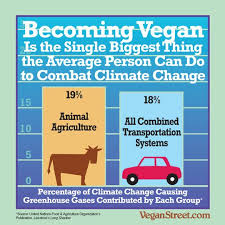 In an authoritative report published by the World Watch institute in 2009, authors Goodland and Anhang concluded that over 51% of greenhouse gases (GHGs) emissions come from livestock.
In an authoritative report published by the World Watch institute in 2009, authors Goodland and Anhang concluded that over 51% of greenhouse gases (GHGs) emissions come from livestock.
A widely cited 2006 report by the United Nations Food and Agriculture Organization, “Livestock’s Long Shadow,” estimated that about 18 percent of annual worldwide greenhouse gas (GHG) emissions are attributable to livestock. However, a more recent analysis by Goodland and Anhang, co-authors of “Livestock and Climate Change” in the December 2009 issue of World Watch magazine, found that livestock and their byproducts actually account for at least 32.6 billion tons of carbon dioxide equivalents per year, or 51 percent of annual worldwide GHG emissions.
The main sources of GHGs from animal agriculture are:
- Deforestation to grow feed for livestock.
- Methane from farm animal metabolism and manure waste. – Methane is 72 times more potent than CO2 in its effect as a global warming gas.
- Refrigeration and transport of meat around the world.
Based on their research, Goodland and Anhang conclude that replacing livestock products with soy and other plant-based alternatives would be the best strategy for reversing climate change. They write, “This approach would have far more rapid effects on GHG emissions and their atmospheric concentrations — and thus on the rate the climate is warming — than actions to replace fossil fuels with renewable energy.”
Thus, we have now been informed of the dangerous path we are on by depending greatly on animal flesh and other animal products for human consumption. The environmental impact is significant. We still have the opportunity to take the most effective steps in saving ourselves and this planet. By simply choosing a plant- based diet we can reduce our climate change footprint by a huge amount. This is the single most powerful action for preventing climate change as animal agriculture is the single largest source of greenhouse gas emissions.
Meat and dairy production also uses a massive amount feed crops and of water which would be better used to feed the world’s hungry and provide water to those in need. Please make a truly environmental, healthy and compassionate choice: choose to drastically reduce your meat and other animal product intake or simply go vegan.
Recent Comments